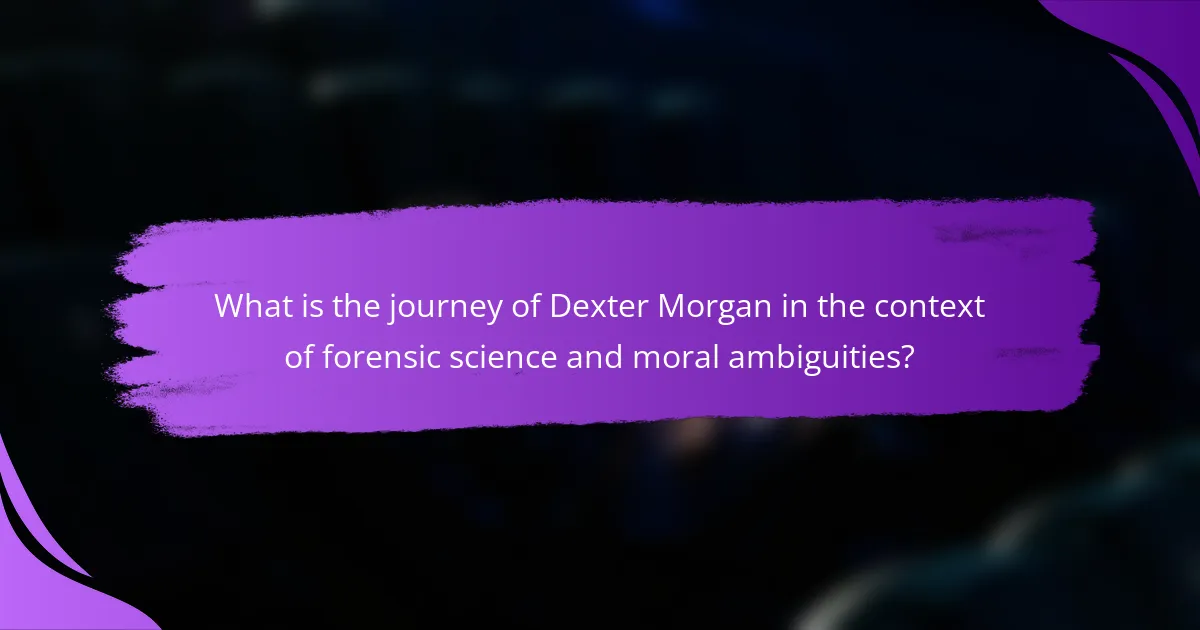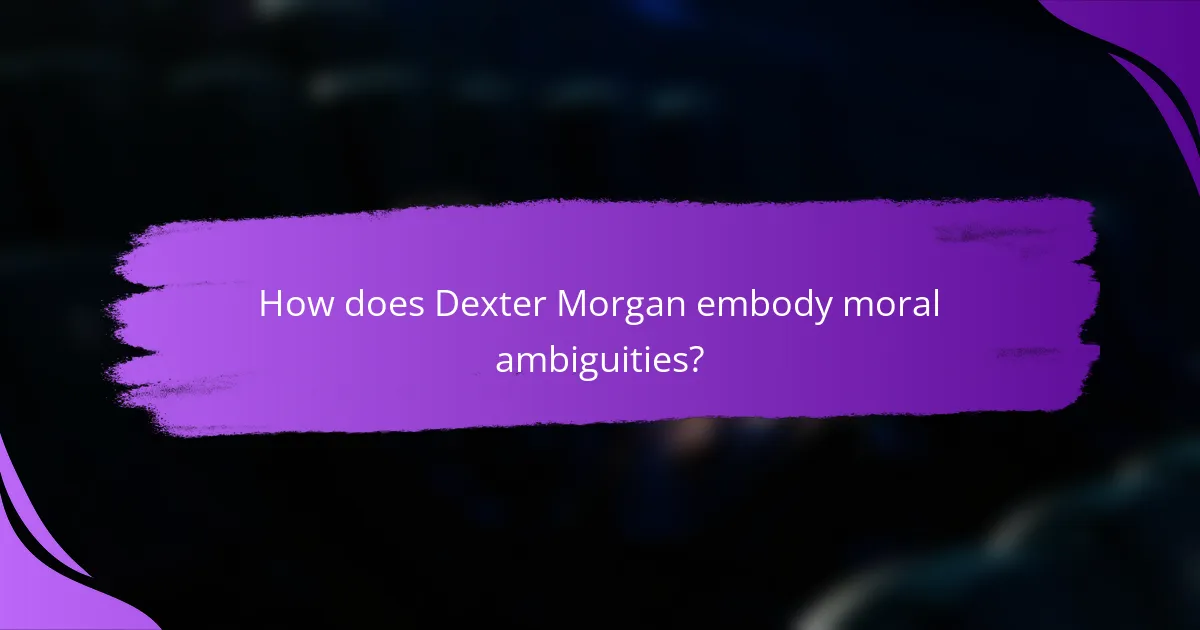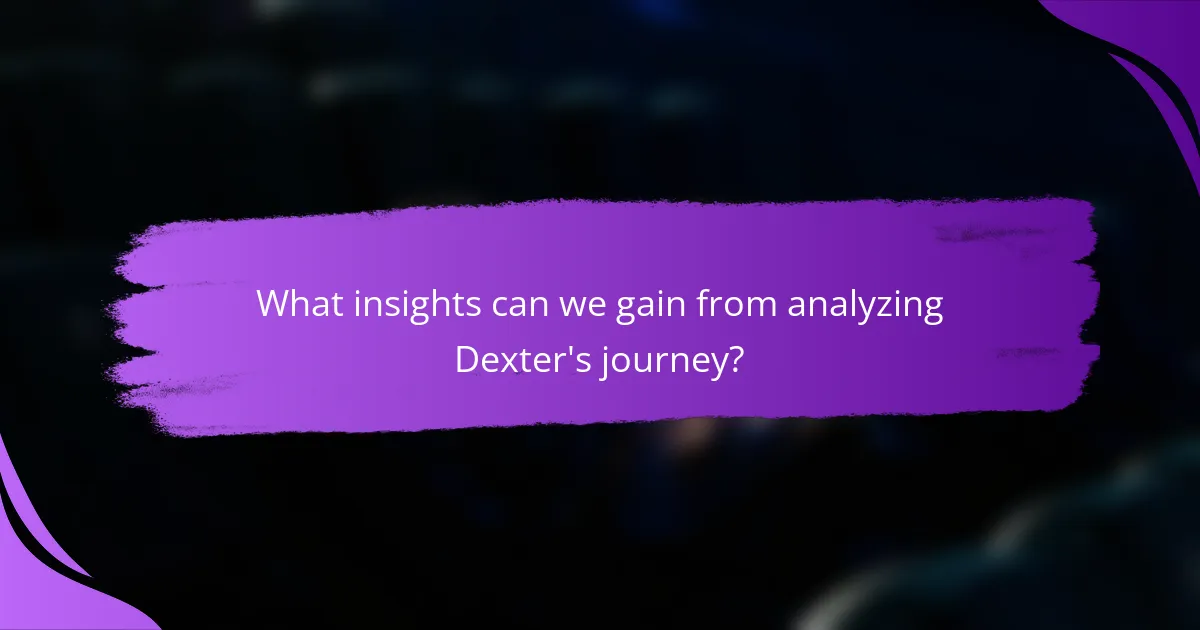Dexter Morgan is a complex character who leads a dual life as a forensic blood spatter analyst and a vigilante serial killer. His journey explores the moral ambiguities of justice, as he targets only those who have committed heinous crimes, guided by a personal code instilled by his adoptive father. This article analyzes Dexter’s internal conflict between his violent impulses and societal expectations, raising critical questions about morality, justice, and the psychological effects of trauma. By examining Dexter’s relationships and choices, the article highlights the broader implications of vigilantism and the intricate nature of human morality.

What is the journey of Dexter Morgan in the context of forensic science and moral ambiguities?
Dexter Morgan’s journey involves his dual life as a forensic blood spatter analyst and a vigilante serial killer. He uses his forensic skills to hunt and kill criminals who escape justice. This creates a complex relationship with morality, as he operates outside the law. Dexter’s moral code, taught by his adoptive father, dictates that he only targets those who have committed heinous crimes. His actions raise ethical questions about justice and vigilantism. Throughout the series, Dexter struggles with his identity and the consequences of his choices. His journey highlights the tension between his professional role and his darker impulses. This duality reflects broader themes of morality in society.
How does Dexter Morgan’s character evolve throughout the series?
Dexter Morgan’s character evolves from a detached vigilante to a more emotionally complex individual. Initially, Dexter is portrayed as a cold-blooded killer who follows a strict code. This code is influenced by his adoptive father, Harry, who teaches him to target only other murderers. As the series progresses, Dexter begins to grapple with his humanity and emotional connections.
He develops relationships with characters like Rita and Debra, which challenge his emotional detachment. Throughout the series, Dexter faces various moral dilemmas that force him to reconsider his actions. His encounters with other killers and law enforcement also contribute to his internal conflict. By the end of the series, Dexter confronts the consequences of his choices. His evolution highlights the struggle between his dark urges and the desire for a normal life.
What key events shape Dexter’s moral compass?
Dexter Morgan’s moral compass is shaped by several key events in his life. The trauma of witnessing his mother’s brutal murder as a child instills a deep sense of justice in him. This event leads to his later vigilante actions against criminals who escape the law. Dexter’s relationship with his adoptive father, Harry Morgan, introduces him to the “Code of Harry.” This code guides Dexter to target only those who have committed heinous crimes. The death of Rita Bennett, Dexter’s wife, profoundly impacts his moral outlook. It forces Dexter to confront the consequences of his actions on those he loves. Additionally, encounters with characters like the Ice Truck Killer challenge Dexter’s understanding of morality. These experiences collectively influence Dexter’s motivations and ethical dilemmas throughout the series.
How do Dexter’s relationships influence his decisions?
Dexter’s relationships significantly influence his decisions throughout the series. His bond with his sister, Deborah, often drives him to reconsider his actions. Dexter’s desire to protect her leads him to make choices that align with her moral compass. Additionally, his relationship with Rita provides him a semblance of normalcy. This connection motivates Dexter to suppress his darker urges for her and their children. Conversely, interactions with antagonists, such as the Trinity Killer, challenge his ethical boundaries. These relationships create internal conflicts that shape Dexter’s choices. Ultimately, his connections to others compel him to navigate the complexities of his dual identity as a forensic expert and a vigilante.
What role does forensic science play in Dexter’s narrative?
Forensic science is central to Dexter’s narrative as it establishes his dual identity. Dexter Morgan, a forensic blood spatter analyst, uses his expertise to conceal his vigilante killings. The forensic elements create tension as they intertwine his professional life with his personal moral code. Each episode often showcases forensic techniques that reveal clues about the crimes he investigates. This connection enhances the drama, highlighting the contrast between his scientific approach to crime and his emotional detachment. The accuracy of forensic science in the series reflects real-life practices, engaging viewers with a sense of authenticity. Dexter’s role as an analyst allows him to stay one step ahead of law enforcement, deepening the narrative’s complexity.
How is forensic science depicted in the series?
Forensic science in the series is depicted as a critical tool for crime-solving. The show illustrates various techniques such as DNA analysis, fingerprinting, and blood spatter analysis. Dexter Morgan, the protagonist, often uses forensic evidence to track and understand his victims. The series emphasizes the importance of scientific accuracy in investigations. It portrays forensic experts as essential in uncovering the truth behind crimes. The depiction aligns with real-world forensic practices, showcasing their complexity and precision. Overall, the series presents forensic science as both a fascinating and vital aspect of criminal investigations.
What are the key forensic techniques showcased in Dexter?
Key forensic techniques showcased in Dexter include blood spatter analysis, DNA profiling, and fingerprint analysis. Blood spatter analysis allows Dexter to determine the position and movement of victims and perpetrators during a crime. DNA profiling is used to identify suspects through biological evidence left at crime scenes. Fingerprint analysis helps in matching prints found at scenes to known individuals. These techniques are integral to the plot, highlighting Dexter’s expertise as a forensic blood spatter analyst. The show accurately portrays these forensic methods, contributing to its realistic depiction of crime scene investigation.

How does Dexter Morgan embody moral ambiguities?
Dexter Morgan embodies moral ambiguities through his dual identity as a forensic blood spatter analyst and a vigilante serial killer. He operates under a personal code that justifies his actions by targeting only those who have committed heinous crimes. This selective morality raises questions about justice and morality. Dexter’s ability to compartmentalize his life allows him to function in society while engaging in morally questionable behavior. His relationships further complicate his moral landscape, as he often struggles between his violent urges and the desire for normalcy. This internal conflict highlights the complexities of human morality. The show illustrates how Dexter’s actions challenge traditional notions of right and wrong, making viewers question the ethics of his vigilantism.
What are the ethical dilemmas faced by Dexter throughout the series?
Dexter Morgan faces several ethical dilemmas throughout the series. He struggles with the morality of killing serial killers to satisfy his own code of justice. This raises questions about vigilantism and the sanctity of life. Dexter also grapples with his dual identity as a forensic blood spatter analyst and a murderer. This conflict creates tension between his professional responsibilities and personal actions. His relationships with family and friends complicate his decisions, as he often prioritizes his dark urges over their well-being. Additionally, Dexter confronts the consequences of his actions, including the impact on innocent lives. These ethical dilemmas highlight the complexities of morality in a flawed justice system.
How do Dexter’s actions challenge traditional notions of justice?
Dexter’s actions challenge traditional notions of justice by operating outside legal frameworks. He enacts vigilante justice, targeting criminals who evade the law. This approach raises ethical questions about morality and legality. Dexter believes he enacts a moral code, prioritizing his version of justice over societal laws. His actions suggest that justice can be subjective and personal. The series illustrates the complexity of right and wrong through Dexter’s choices. By killing those he deems unworthy, he undermines the judicial system. This creates a conflict between moral righteousness and legal accountability.
What justifications does Dexter provide for his vigilantism?
Dexter justifies his vigilantism by claiming he targets only those who have escaped justice. He believes that the legal system fails to punish certain criminals. Dexter’s code, taught by his father, guides him to kill only those who are guilty. He rationalizes his actions by stating they prevent future crimes. Dexter views himself as a necessary force against evil. He believes his actions serve a greater good. His background as a forensic expert informs his choices. This combination of personal ethics and professional insight shapes his vigilantism.
How do audience perceptions of Dexter’s morality shift over time?
Audience perceptions of Dexter’s morality shift significantly over time. Initially, viewers may perceive Dexter Morgan as a vigilante hero. His meticulous targeting of criminals who escape justice resonates with audiences seeking moral clarity. However, as the series progresses, moral ambiguity becomes more pronounced. Dexter’s actions lead to collateral damage, complicating audience sentiments. Viewers grapple with the ethics of his vigilantism as innocent lives are affected. By the series’ conclusion, many audience members see Dexter as a morally flawed antihero. This evolution reflects broader themes of justice and morality in society. The shift in perception is influenced by character development and narrative complexity throughout the series.
What factors contribute to the audience’s empathy towards Dexter?
The audience’s empathy towards Dexter Morgan is influenced by his complex character and relatable struggles. Dexter is portrayed as a vigilante who targets criminals, which creates a moral ambiguity. This duality allows viewers to connect with his desire for justice while grappling with his dark urges. Additionally, Dexter’s traumatic childhood and emotional isolation evoke sympathy. His internal conflicts highlight his humanity, making him more relatable. The character’s vulnerability is showcased through his relationships, particularly with his sister, Debra, and his son, Harrison. These connections reveal his desire for love and acceptance. Overall, the combination of moral complexity, personal trauma, and relational depth fosters empathy among the audience.
How does the series provoke discussions on morality and justice?
The series provokes discussions on morality and justice by presenting complex ethical dilemmas. Dexter Morgan, the main character, embodies a vigilante approach to justice. He targets criminals who have escaped legal consequences. This raises questions about the morality of taking justice into one’s own hands. The series challenges viewers to consider the effectiveness of the legal system. It also explores the impact of personal trauma on moral decision-making. Characters in the series often face moral conflicts that resonate with real-life issues. These elements encourage audiences to engage in debates about right and wrong. The narrative structure invites reflection on the nature of justice itself.

What insights can we gain from analyzing Dexter’s journey?
Analyzing Dexter’s journey provides insights into the complexities of morality and justice. Dexter Morgan’s character embodies the struggle between his violent urges and his moral code. This duality raises questions about the nature of good and evil. His actions challenge traditional notions of justice, illustrating how personal experiences shape ethical beliefs. The series also highlights the psychological impact of trauma on behavior. Dexter’s relationships further reveal the conflict between his true self and societal expectations. Overall, his journey serves as a lens to examine the consequences of vigilantism and the human psyche.
How can viewers interpret the balance between justice and morality in Dexter?
Viewers can interpret the balance between justice and morality in Dexter through the character’s duality. Dexter Morgan embodies a vigilante who seeks justice for victims of violent crimes. He operates outside the law, often leading to moral dilemmas. The show presents his actions as both justified and morally questionable.
Dexter’s code, taught by his father, emphasizes killing only those who have escaped legal punishment. This creates a complex narrative around his pursuit of justice. Viewers may see his actions as necessary in a flawed justice system. However, the morality of taking a life remains contentious.
The series challenges viewers to consider the implications of Dexter’s choices. Each kill raises questions about the nature of justice. The show juxtaposes legal justice against personal morality. This tension invites varied interpretations from the audience.
What lessons does Dexter’s journey teach about human nature?
Dexter’s journey teaches that human nature is complex and often contradictory. It highlights the struggle between morality and instinct. Dexter embodies a duality, being both a protector and a predator. This reflects the inner conflict present in many individuals. The series illustrates how trauma shapes behavior and ethical boundaries. Dexter’s code of ethics raises questions about justice and vengeance. It showcases the capacity for both good and evil within a single person. Ultimately, it demonstrates that understanding human nature requires acknowledging its multifaceted nature.
How can understanding Dexter’s character inform real-world discussions on crime and justice?
Understanding Dexter’s character can inform real-world discussions on crime and justice by highlighting the complexities of morality in criminal behavior. Dexter, a vigilante serial killer, operates under a personal code that differentiates between innocent victims and those he deems deserving of death. This duality raises questions about justice and the ethics of taking the law into one’s own hands.
His character challenges the traditional notions of right and wrong. It encourages viewers to consider the motivations behind criminal actions. Dexter’s experiences reflect the psychological struggles faced by individuals in the justice system. This can lead to deeper discussions about rehabilitation versus punishment.
Moreover, Dexter’s interactions with law enforcement illustrate the challenges of forensic science in solving crimes. His ability to evade capture while adhering to his code prompts analysis of the effectiveness of current justice practices. By examining Dexter’s character, audiences can engage in meaningful dialogues about the implications of crime, justice, and morality in society.
What are practical takeaways for viewers from Dexter’s story?
Viewers can take away the importance of understanding moral ambiguity. Dexter’s character illustrates the complexity of right and wrong. His actions challenge viewers to consider the consequences of vigilante justice. The show emphasizes the psychological impact of trauma on behavior. It also highlights the significance of personal ethics in decision-making. Dexter’s duality serves as a reminder of the human capacity for both good and evil. Additionally, the series encourages discussions on the effectiveness of the justice system. Overall, Dexter’s story prompts reflection on morality and justice in society.
How can we apply the moral lessons from Dexter’s journey to our lives?
We can apply the moral lessons from Dexter’s journey by reflecting on the complexities of morality. Dexter’s character illustrates the struggle between right and wrong. He operates under a personal code that justifies his actions. This highlights the importance of accountability in our choices. We can learn to consider the consequences of our actions. Dexter’s journey shows that understanding our motivations is crucial. Additionally, it emphasizes the need for self-awareness in moral decision-making. By analyzing his experiences, we can better navigate our ethical dilemmas.
What discussions should we encourage about morality and ethics in media?
Discussions about morality and ethics in media should focus on the portrayal of complex characters and their choices. Media often presents moral dilemmas that challenge viewers’ perceptions of right and wrong. For example, shows like “Dexter” depict protagonists who engage in morally questionable actions for perceived justifications. This raises questions about the ethics of vigilante justice and the consequences of such actions.
Encouraging dialogue on these topics can help audiences critically analyze character motivations and societal implications. Discussions should also consider the impact of media on public perceptions of justice and morality. Research indicates that media representations can shape audience attitudes and beliefs about ethical behavior. Engaging in these discussions promotes a deeper understanding of morality in storytelling and its effects on viewers.
The main entity of the article is Dexter Morgan, a character who embodies the complexities of forensic science and moral ambiguities. The article explores Dexter’s dual identity as a forensic blood spatter analyst and a vigilante serial killer, highlighting the ethical dilemmas he faces and the impact of his relationships on his decisions. Key elements include the evolution of Dexter’s character, the role of forensic science in his narrative, and the moral questions raised by his actions. The analysis provides insights into the balance between justice and morality, the influence of trauma on ethical choices, and the broader implications for discussions on crime and justice in society.